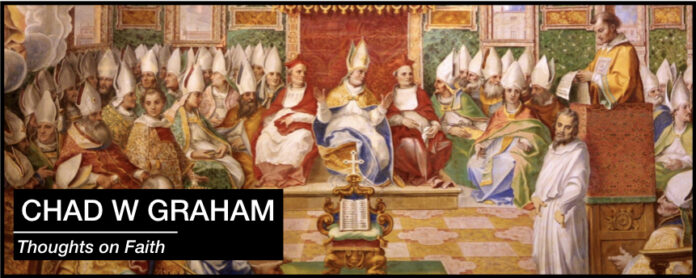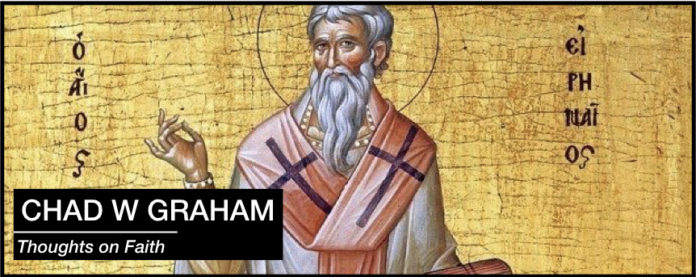The identity of Jesus is not without controversy. It is, however, necessary to think of Jesus Christ as God, if one is a Christian. I was recently reminded of the enduring importance of this. A Facebook post reflecting on the Church’s historic understanding of the relationship between God the Creator as Father and Jesus Christ as God the Son was challenged. A comment argued that Christ’s Sonship did not affirm his divinity, and in fact, had implications denying his deity.
The New Testament Viewed Jesus as God
The Bible, however, is the source of our understanding Jesus, the Son of God as divine. We see it in Jesus own words, “I and the father are one” (John 10:30). We see it in the declaration of Thomas the Apostle after seeing the risen Jesus, “My Lord and my God” (John 20:28).
The Book of 1 Thessalonians may be the earliest New Testament document and one historians have a high degree of confidence attributing to the Apostle Paul. It equates “God the Father and the Lord Jesus Christ” (1 Thessalonians 1:1) in a way quit inappropriate for a mere human. Jesus title, “Lord,” is one that a first century Jew would equate to the title of the Old Testament God. “Lord” is the same word the translators of the LXX (the Greek Old Testament) used for God’s personal name. This translation was the primary Bible of the early Church. The church (the people of God) is to be found “in” both “the Father AND the Lord”. Shortly after the Apostle speaks of the Thessalonians believers’ “hope in our Lord Jesus Christ (1 Thessalonians 1:3). Chapter 4:13-18 speaks to his return in power. Paul notes his inspiration of prophecy, having received this information “by a word from the Lord” (4:15). God will vivify, or bring the saints “the dead in Christ”(4:16) to life “through Jesus” (4:14).
The authorship and date of Titus has been more hotly contested. I follow the internal evidence and scholarship that affirms its Pauline origin. Either way, it is irrefutably an early, authoritative Christian document. In Titus 2:13 Christians are described as those living righteously in this present age, “waiting for our blessed hope, the appearing of the glory of our great God and Savior Jesus Christ.” Jesus, in the New Testament is “our great God and Saviour”. And so he is worthy of worship (see Revelation chapter 5).
The Early Church Viewed Jesus as God
This New Testament witness to the divinity of Jesus fit with the worship experience of the early church. The Church consisted of those baptized into “the Name” (a singular noun) of the Father, and of the Son, and of the Holy Spirit” (Matthew 28:19) who was then worshipped and glorified along side the Father.
“2 Clement” appears to be a sermon, perhaps addressed to the Church of Corinth. According to Michael Holmes (Apostolic Fathers), the most likely date of the composition is between AD 120-140 (134).
The Christian Must View Jesus as God
The text of 2 Clement is now more generally labeled as “An Ancient Christian Homily.” (Rick Brannan, “Apostolic Fathers Greek-English Interlinear” Lexham Press, 2011). This title draws out many implications. It is a sample from Ancient Christian Worship, which has stood the test of time form the early 2nd century to the present. The first Generation of Christians after the Apostles understood:
Ἀδελφοί, οὕτως δεῖ ἡμᾶς φρονεῖν περὶ Ἰησοῦ Χριστοῦ, ὡς περὶ Θεοῦ, ὡς περὶ κριτοῦ ζώντων καὶ νεκρῶν. καὶ οὐ δεῖ ἡμᾶς μικρὰ φρονεῖν περὶ τῆς σωτηρίας ἡμῶν· 2ἐν τῷ γὰρ φρονεῖν ἡμᾶς μικρὰ περὶ αὐτοῦ, μικρὰ καὶ ἐλπίζομεν λαβεῖν.
Here we read an address to Christians, known as “Ἀδελφοί” (“Brothers and sisters”). They are told “οὕτως δεῖ ἡμᾶς φρονεῖν περὶ Ἰησοῦ Χριστοῦ, ὡς περὶ Θεοῦ” (“It is necessary for us to think with regard to Jesus Christ, just as we think with regard to God”). This necessity is declared by the opening words “οὕτως δεῖ“. They tell us that it is “necessary,” or “binding,” to think of Jesus in “just the same way” as we think of God.
This testimony is compelling. We must think of Jesus “as judge of the living and the dead.” In the second verse, the homily makes a rhetorical point. It argues, “for in as much as we think little of him” (ie less than God) “we also can hope for little from him.” We must think of Jesus, if he is to be our Saviour, “as God.”
Creeds Viewed Jesus as God
The Ancient Homily reflected the New Testament and the universal Christian recognition of the equality of Jesus with God. The homily speaks of Jesus worthiness to be worshiped and glorified with God. This Christian expectation began with their baptism and continued in their experience of weekly worship. There is much truth to the motto Lex orandi, lex credendi (“The Law of Prayer” states that what we worship is what we believe). People began, however, to speak of this relationship in terms that did not meet believer’s expectations.
Dating couples often run into that awkward stage of not knowing where the relationship stands. Something makes us question what we had assumed to be true of the relationship. The early church hit something similar in the later third century. Was what they had always believed to be true correct? Where they wrong? The Church needed a DTR (“Define the Relationship”) conversation.
And so leaders from all across the world gathered at Nicea in AD 325 to have a DTR conversation. They affirmed (as slightly amended in AD 381) the Church’s ancient belief:
in one Lord Jesus Christ, the Only Begotten Son of God, born of the Father before all ages. God from God, Light from Light, true God from true God, begotten, not made, consubstantial with the Father; through him all things were made.
Today’s Church must View Jesus as God
Jesus is truly God. For a more complete understanding of the Christian view of God, check out a recent edition of The GoodFaith Podcast The Trinity: Is God one, or Three?
For more on the recent controversy regarding the Trinity, which generated the FaceBook conversation I spoke of at the start of this post, see What is the Trinity Debate About?







